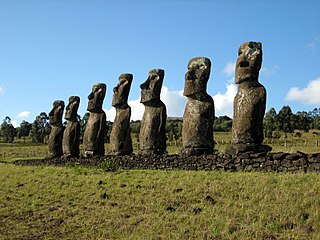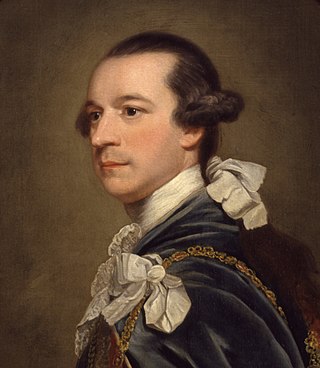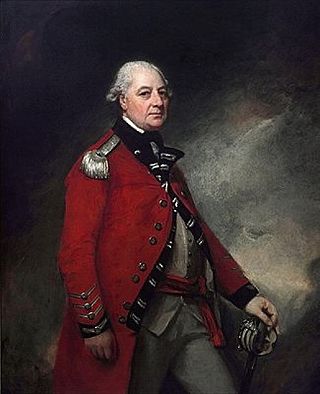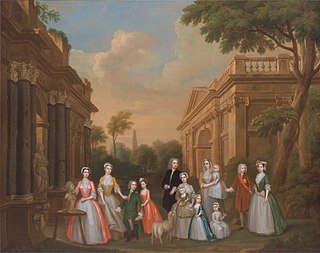Other years |
| Countries of the United Kingdom |
| Scotland |
| Sport |
| 1730 English cricket season |
Events from the year 1730 in Great Britain .
Other years |
| Countries of the United Kingdom |
| Scotland |
| Sport |
| 1730 English cricket season |
Events from the year 1730 in Great Britain .
The 1730s decade ran from January 1, 1730, to December 31, 1739.

1730 (MDCCXXX) was a common year starting on Sunday of the Gregorian calendar and a common year starting on Thursday of the Julian calendar, the 1730th year of the Common Era (CE) and Anno Domini (AD) designations, the 730th year of the 2nd millennium, the 30th year of the 18th century, and the 1st year of the 1730s decade. As of the start of 1730, the Gregorian calendar was 11 days ahead of the Julian calendar, which remained in localized use until 1923.

1722 (MDCCXXII) was a common year starting on Thursday of the Gregorian calendar and a common year starting on Monday of the Julian calendar, the 1722nd year of the Common Era (CE) and Anno Domini (AD) designations, the 722nd year of the 2nd millennium, the 22nd year of the 18th century, and the 3rd year of the 1720s decade. As of the start of 1722, the Gregorian calendar was 11 days ahead of the Julian calendar, which remained in localized use until 1923.

Charles Watson-Wentworth, 2nd Marquess of Rockingham, was a British Whig statesman and magnate, most notable for his two terms as prime minister of Great Britain. He became the patron of many Whigs, known as the Rockingham Whigs, and served as a leading Whig grandee. He served in only two high offices during his lifetime but was nonetheless very influential during his one and a half years of service.

Marquess of Bristol is a title in the Peerage of the United Kingdom held by the Hervey family since 1826. The Marquess's subsidiary titles are Earl of Bristol, Earl Jermyn, of Horningsheath in the County of Suffolk (1826), and Baron Hervey, of Ickworth in the County of Suffolk (1703). The Hervey barony is in the Peerage of England, the earldom of Bristol in the Peerage of Great Britain and the Jermyn earldom in the Peerage of the United Kingdom. Earl Jermyn is used as courtesy title by the Marquess's eldest son and heir. The Marquess of Bristol also holds the office of Hereditary High Steward of the Liberty of St Edmund. The present holder of these titles is Frederick Hervey, the 8th Marquess and 12th Earl of Bristol.

Charles Townshend, 2nd Viscount Townshend, was an English Whig statesman. He served for a decade as Secretary of State for the Northern Department from 1714 to 1717 and again from 1721 to 1730. He directed British foreign policy in close collaboration with his brother-in-law, prime minister Robert Walpole. He was often known as Turnip Townshend because of his strong interest in farming turnips and his role in the British Agricultural Revolution.

Marquess of Rockingham, in the County of Northampton, was a title in the Peerage of Great Britain. It was created in 1746 for Thomas Watson-Wentworth, 1st Earl of Malton. The Watson family descended from Lewis Watson, Member of Parliament for Lincoln. He was created a Baronet, of Rockingham Castle in the County of Northampton, in the Baronetage of England in 1621. In 1645 he was further honoured when he was raised to the Peerage of England as Baron Rockingham. The third Baron served as Lord-Lieutenant of Kent. In 1714 he was created Baron Throwley, Viscount Sondes and Earl of Rockingham in the Peerage of Great Britain. His eldest son Edward Watson, Viscount Sondes, predeceased him and he was succeeded by his grandson, the second Earl. The second Earl was Lord-Lieutenant of Kent before his early death in 1745. He was childless and was succeeded by his younger brother, Thomas. He had previously represented Canterbury in Parliament.

Field Marshal George Townshend, 1st Marquess Townshend, PC, known as The Viscount Townshend from 1764 to 1787, was a British soldier and politician. After serving at the Battle of Dettingen during the War of the Austrian Succession and the Battle of Culloden during the Jacobite Rising, Townshend took command of the British forces for the closing stages of the Battle of the Plains of Abraham during the Seven Years' War. He went on to be Lord Lieutenant of Ireland or Viceroy where he introduced measures aimed at increasing the size of Irish regiments, reducing corruption in Ireland and improving the Irish economy. In cooperation with Prime Minister North in London, he solidified governmental control over Ireland. He also served as Master-General of the Ordnance, first in the North Ministry and then in the Fox–North Coalition.

Earl Fitzwilliam was a title in both the Peerage of Ireland and the Peerage of Great Britain held by the head of the Fitzwilliam family.
This is an incomplete list of people who have served as Lord Lieutenant of Norfolk. Since 1689, all Lord Lieutenants have also been Custos Rotulorum of Norfolk.
This is a list of people who have served as Custos Rotulorum of the North Riding of Yorkshire.

Charles William Wentworth Fitzwilliam, 5th Earl Fitzwilliam in the peerage of Ireland, and 3rd Earl Fitzwilliam in the peerage of Great Britain, was a British nobleman and politician. He was president three times of the Royal Statistical Society in 1838–1840, 1847–1849, and 1853–1855; and president of the British Association for the Advancement of Science in its inaugural year (1831–2).
Events from the year 1738 in Great Britain.
Events from the year 1782 in Great Britain. The American Revolutionary War draws to a close.
Gentleman of the Bedchamber was a title in the Royal Household of the Kingdom of England from the 11th century, later used also in the Kingdom of Great Britain. A Lord of the Bedchamber was a courtier in the Royal Household; the term being first used in 1718. The duties of the Lords and Gentlemen of the Bedchamber originally consisted of assisting the monarch with dressing, waiting on him when he ate, guarding access to his bedchamber and closet and providing companionship. Such functions became less important over time, but provided proximity to the monarch; the holders were thus trusted confidants and often extremely powerful. The offices were in the gift of The Crown and were originally sworn by Royal Warrant directed to the Lord Chamberlain.
Events from the year 1717 in Great Britain.

Thomas Watson-Wentworth, 1st Marquess of Rockingham, KB, PC (I) of Wentworth Woodhouse, Yorkshire was a British Whig politician who sat in the House of Commons from 1715 until 1728 when he was raised to the Peerage as Baron Malton.